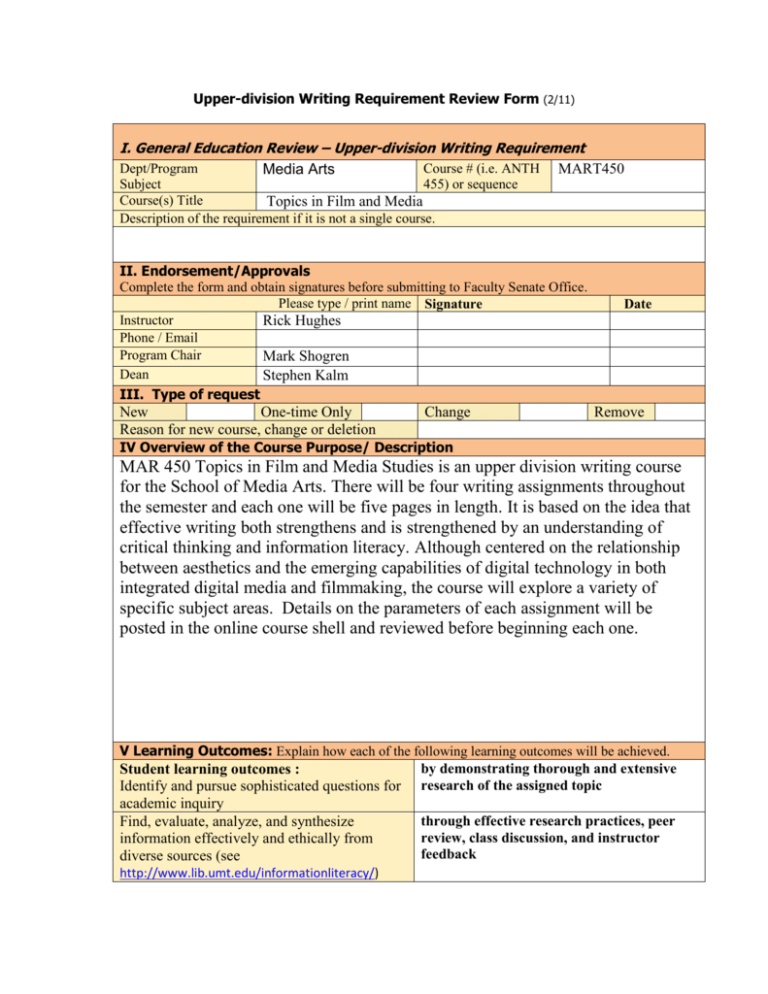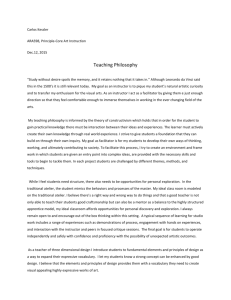I. General Education Review – Upper
advertisement

Upper-division Writing Requirement Review Form (2/11) I. General Education Review – Upper-division Writing Requirement Dept/Program Course # (i.e. ANTH MART450 Media Arts Subject 455) or sequence Course(s) Title Topics in Film and Media Description of the requirement if it is not a single course. II. Endorsement/Approvals Complete the form and obtain signatures before submitting to Faculty Senate Office. Please type / print name Signature Instructor Rick Hughes Phone / Email Program Chair Mark Shogren Dean Stephen Kalm III. Type of request New One-time Only Reason for new course, change or deletion Change Date Remove IV Overview of the Course Purpose/ Description MAR 450 Topics in Film and Media Studies is an upper division writing course for the School of Media Arts. There will be four writing assignments throughout the semester and each one will be five pages in length. It is based on the idea that effective writing both strengthens and is strengthened by an understanding of critical thinking and information literacy. Although centered on the relationship between aesthetics and the emerging capabilities of digital technology in both integrated digital media and filmmaking, the course will explore a variety of specific subject areas. Details on the parameters of each assignment will be posted in the online course shell and reviewed before beginning each one. V Learning Outcomes: Explain how each of the following learning outcomes will be achieved. by demonstrating thorough and extensive Student learning outcomes : Identify and pursue sophisticated questions for research of the assigned topic academic inquiry Find, evaluate, analyze, and synthesize information effectively and ethically from diverse sources (see http://www.lib.umt.edu/informationliteracy/) through effective research practices, peer review, class discussion, and instructor feedback Manage multiple perspectives as appropriate Recognize the purposes and needs of discipline-specific audiences and adopt the academic voice necessary for the chosen discipline Use multiple drafts, revision, and editing in conducting inquiry and preparing written work Follow the conventions of citation, documentation, and formal presentation appropriate to that discipline Develop competence in information technology and digital literacy (link) through peer review, class discussion, and instructor feedback on a variety of topics through in-class examples, effective research practices, peer review, class discussion, and instructor feedback revisions are accepted by uploading work to the Moodle course shell and interacting with the instructor each paper is reviewed for proper convention by the instructor by demonstrating best practices in the search capabilities of the internet/web digital technology environment VI. Writing Course Requirements Enrollment is capped at 25 students. If not, list maximum course enrollment. Explain how outcomes will be adequately met for this number of students. Justify the request for variance. enrollment is capped at 25 students and the class uses a system of peer review, class discussion, and instructor feedback Briefly explain how students are provided with tools and strategies for effective writing and editing in the major. Best practice examples are posted to the Moodle shell for each assignment and guest speakers specific to the topic are invited to share their perspective on good writing practices. All Which written assignment(s) includes revision in response to instructor’s feedback? VII. Writing Assignments: Please describe course assignments. Students should be required to individually compose at least 20 pages of writing for assessment. At least 50% of the course grade should be based on students’ performance on writing assignments. Quality of content and writing are integral parts of the grade on any writing assignment. Formal Graded Assignments 1. The Op-Ed piece - Compose an op-ed piece centered on a current cultural, social or artistic reality that articulates your position. 2. The Biographical Sketch - Research an artistic historical figure from any artistic discipline who has impacted your life in some meaningful way. 3. The Review - Choose an emerging artist, writer or filmmaker and compose an in-depth review of their process and work. It can be based on a specific piece or a body of work. 4. The Artist Statement - Compose a piece that articulates your artistic perspective and what you hope to accomplish as you begin your Informal Ungraded Assignments As requested VIII. Syllabus: Paste syllabus below or attach and send digital copy with form. For assistance on syllabus preparation see: http://teaching.berkeley.edu/bgd/syllabus.html The syllabus must include the following: 1. Writing outcomes 2. Information literacy expectations 3. Detailed requirements for all writing assignments or append writing assignment instructions Paste syllabus here. MAR 450: 01 Topics in Film and Media Studies SYLLABUS Professor Rick Hughes MAR 450 Office Hours: by Appointment Email: richard.hughes@umontana.edu Course Overview MAR 450 Topics in Film and Media Studies is an upper division writing course for the School of Media Arts. There will be four writing assignments throughout the semester and each one will be five pages in length. It is based on the idea that effective writing both strengthens and is strengthened by an understanding of critical thinking and information literacy. Although centered on the relationship between aesthetics and the emerging capabilities of digital technology in both integrated digital media and filmmaking, the course will explore a variety of specific subject areas. Details on the parameters of each assignment will be posted in the online course shell and reviewed before beginning each one. They will be divided into the following writing assignments: 1. The Op-Ed piece - Compose an op-ed piece centered on a current cultural, social or artistic reality that articulates your position. 2. The Biographical Sketch - Compose a biographical sketch of a historical artistic figure that presents the reader with a solid overview of their work and the impact that they have had on the development of our contemporary aesthetic environment. 3. The Review - Choose an emerging artist, writer or filmmaker and compose an indepth review of their process and work. It can be based on a specific piece or a body of work. 4. The Artist Statement - Compose a piece that articulates your artistic perspective and what you hope to accomplish as you begin your professional career. Outcomes The cultural, social, and technological landscape continues to change dramatically so it is critical that the student artist develop the skills necessary to adapt to the realities of the 21st century and the world that they actually live in. At the conclusion of this course students should be able to use writing as a means of finding, synthesizing, analyzing, and evaluating information, retaining course material, and using that information and material in order to form and express coherent thoughts and arguments. In addition they should have an expanded understanding of the historical relationship between digital technology and art and be able to articulate the constantly evolving environment of artistic expression. Research / Assignments In this course there will be a total of 4 writing assignments (a detailed description of each can be found in the Assignments area in the online course shell). You will be responsible for researching the assigned topic and composing a five-page double space writing assignment. Do not cut and paste information from websites. Your responsibility is to articulate a clear and concise perspective based on the information. Each assignment must be a Word file. See Course Calendar for due dates and specific topic information. You will be responsible for listing all of your sources for each assignment. Grading Procedure Grades will be based primarily on the student’s ability to: 1. Demonstrate an understanding of the specific characteristics and integrative capabilities of the assigned topic. 2. Articulate a clear and concise perspective. Cutting and pasting or copying word for word off the Internet will also result in loss of points. 3. Present an organized paper including proper and punctual delivery of the assignment files. (See the Course Information area for specifics) 4. Being present in class. There will be a total of 100 points and each assignment will be worth 25 points. Re-writes are accepted. Points will translate into the following letter grade: A 95-100 A- 90-94 B+ 86-89 B 83-85 B- 80-82 C+ 76-79 C 73-75 C- 70-72 D 60-69 F 0-59 Academic Misconduct and the Student Conduct Code All students must practice academic honesty. Academic misconduct is subject to an academic penalty by the course instructor and/or disciplinary sanction by the University. All students need to be familiar with the Student Conduct Code. The Code is available online at http://life.umt.ed/vpsa/student_conduct.php









